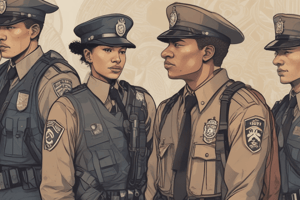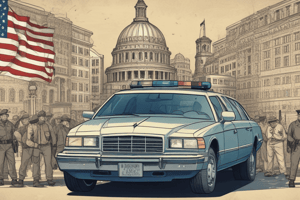Podcast
Questions and Answers
What percentage of waking time do humans spend on linguistic communication?
What percentage of waking time do humans spend on linguistic communication?
- 90%
- 50%
- 70% (correct)
- 80%
What is one barrier to communication faced by law enforcement officers?
What is one barrier to communication faced by law enforcement officers?
- Fear of public speaking
- Lack of education
- Fear of authority (correct)
- Lack of experience
What percentage of waking time do law enforcement officers spend on linguistic communication?
What percentage of waking time do law enforcement officers spend on linguistic communication?
- 80%
- 100%
- 95%
- 90% (correct)
Why do some cultures teach women and children not to talk to law enforcement?
Why do some cultures teach women and children not to talk to law enforcement?
What is essential for law enforcement officers to communicate effectively with the public?
What is essential for law enforcement officers to communicate effectively with the public?
What is a principle of overcoming barriers to communication?
What is a principle of overcoming barriers to communication?
Why is it essential to learn common words and phrases of an ethnic group?
Why is it essential to learn common words and phrases of an ethnic group?
What is the main impact of having a limited vocabulary?
What is the main impact of having a limited vocabulary?
Why is it necessary to be respectful of a person's social background?
Why is it necessary to be respectful of a person's social background?
What is the impact of the media on the community's perception of law enforcement?
What is the impact of the media on the community's perception of law enforcement?
What is essential for law enforcement to deliver a professional response?
What is essential for law enforcement to deliver a professional response?
What is necessary to overcome communication barriers?
What is necessary to overcome communication barriers?
What is the most effective way to resolve communication breakdowns?
What is the most effective way to resolve communication breakdowns?
What is the key to becoming a more effective communicator?
What is the key to becoming a more effective communicator?
What is the primary category of barriers to communication that can be caused by physical illness or mechanical failures?
What is the primary category of barriers to communication that can be caused by physical illness or mechanical failures?
Why is it essential to be aware of one's own prejudices?
Why is it essential to be aware of one's own prejudices?
What is the impact of a law enforcement agency's reputation on communication?
What is the impact of a law enforcement agency's reputation on communication?
What is the result of failing to perceive someone's role or feelings in communication?
What is the result of failing to perceive someone's role or feelings in communication?
How many 'persons' do we consider ourselves to be in a communication situation?
How many 'persons' do we consider ourselves to be in a communication situation?
What is necessary for effective communication?
What is necessary for effective communication?
What type of barrier to communication is closely related to perceptual barriers?
What type of barrier to communication is closely related to perceptual barriers?
What is the primary source of misunderstanding and failure to communicate in groups?
What is the primary source of misunderstanding and failure to communicate in groups?
What is the benefit of relating as individuals without rank in daily communication?
What is the benefit of relating as individuals without rank in daily communication?
What is the primary reason for the negative reaction to the term 'pig' in the 1960s?
What is the primary reason for the negative reaction to the term 'pig' in the 1960s?
What is the ultimate goal of overcoming barriers to communication?
What is the ultimate goal of overcoming barriers to communication?
What is the key to overcoming physical barriers to communication?
What is the key to overcoming physical barriers to communication?
What is an attitudinal barrier?
What is an attitudinal barrier?
What is a major obstacle to effective communication that people often create unconsciously?
What is a major obstacle to effective communication that people often create unconsciously?
What is the 'halo effect'?
What is the 'halo effect'?
What is a significant aspect of nonverbal communication?
What is a significant aspect of nonverbal communication?
What can be a job-related barrier to communication in law enforcement?
What can be a job-related barrier to communication in law enforcement?
What is the estimated percentage of social messages transmitted nonverbally?
What is the estimated percentage of social messages transmitted nonverbally?
Why do law enforcement officers often develop a negative attitude?
Why do law enforcement officers often develop a negative attitude?
What can interdepartmental or intradepartmental frictions often cause?
What can interdepartmental or intradepartmental frictions often cause?
What is the importance of choosing the right words in communication?
What is the importance of choosing the right words in communication?
What is a common problem in communication among law enforcement officers?
What is a common problem in communication among law enforcement officers?
What must we do to overcome intercultural and interracial barriers?
What must we do to overcome intercultural and interracial barriers?
What is necessary to overcome communication barriers?
What is necessary to overcome communication barriers?
What is the role of effective listening in communication?
What is the role of effective listening in communication?
Why do law enforcement officers often fail to listen effectively?
Why do law enforcement officers often fail to listen effectively?
What is a key to overcoming barriers to communication?
What is a key to overcoming barriers to communication?
What is the importance of understanding the perspective of the other person?
What is the importance of understanding the perspective of the other person?
Why are we often afraid to listen to what others think or believe about a problem?
Why are we often afraid to listen to what others think or believe about a problem?
What is the result of using the wrong words in communication?
What is the result of using the wrong words in communication?
What is essential to overcome communication barriers?
What is essential to overcome communication barriers?
What is the significance of Winston Churchill's words?
What is the significance of Winston Churchill's words?
What is the estimated percentage of officers or trainees who will never have to take a specialized course in listening or attention?
What is the estimated percentage of officers or trainees who will never have to take a specialized course in listening or attention?
What is the primary method of learning for humans?
What is the primary method of learning for humans?
What is the leading cause of death in the United States, according to the text?
What is the leading cause of death in the United States, according to the text?
What percentage of people who succeed at suicide have attempted it previously?
What percentage of people who succeed at suicide have attempted it previously?
What is a common sign of a potential suicide victim?
What is a common sign of a potential suicide victim?
What should be done when someone appears suicidal or is threatening suicide?
What should be done when someone appears suicidal or is threatening suicide?
What is a common feeling that accompanies thoughts of suicide?
What is a common feeling that accompanies thoughts of suicide?
What is the primary challenge of police work, according to the text?
What is the primary challenge of police work, according to the text?
Why are some suicides classified as accidental deaths?
Why are some suicides classified as accidental deaths?
What is the ranking of suicide as a cause of death among adolescents in the 15-19-year-old range?
What is the ranking of suicide as a cause of death among adolescents in the 15-19-year-old range?
What is the primary goal of a police officer when encountering an individual bent on self-destruction?
What is the primary goal of a police officer when encountering an individual bent on self-destruction?
Where can a police officer find resources to help individuals with a high suicide risk?
Where can a police officer find resources to help individuals with a high suicide risk?
What is a resource that police officers can use to communicate with non-English speaking individuals?
What is a resource that police officers can use to communicate with non-English speaking individuals?
Why is it important for police officers to be aware of resources that can help non-English speaking individuals?
Why is it important for police officers to be aware of resources that can help non-English speaking individuals?
How can a police officer learn an additional language to improve communication with non-English speaking individuals?
How can a police officer learn an additional language to improve communication with non-English speaking individuals?
What is the purpose of having a ready reference available when encountering an individual with a high suicide risk?
What is the purpose of having a ready reference available when encountering an individual with a high suicide risk?
Flashcards are hidden until you start studying
Study Notes
Communication Barriers in Law Enforcement
- 70% of a person's waking time is spent in some form of linguistic communication (reading, writing, speaking, or listening)
- For law enforcement, about 90% (or more) of their waking time is spent in one of the four communication types (reading, writing, speaking, and/or listening)
Barriers to Communication
- Fear of authority
- Ethnic differences
- Educational levels
- Level of communication
- Language barriers
- Ethnic background
- Social background
- Police/citizen rapport
- Authority
- Prejudice
- Objectivity
Overcoming Barriers to Communication
- Recognize and admit that barriers exist
- Identify the barriers and factors that impact them
- Be willing to accept at least part of the responsibility for the barriers
- Develop a desire and willingness to overcome the barriers
- Take positive action to overcome the barriers
Categories of Barriers
- Physical barriers
- Physical illness
- Mechanical failures
- Language differences
- Poor, inadequate, uncomfortable facilities
- Physical discomfort (hard chairs, temperature, fatigue, noise)
- Perceptual barriers
- Misperceptions
- Spatial situations
- Failure to perceive someone's role or feelings
- Psychological/attitudinal barriers
- Status gaps
- Semantic differences
- Attitudinal barriers (failures to accept opposing views)
- The "halo effect" (perceiving someone in a very negative or positive way)
- Job-related barriers
- Failure to accept that a "police culture" exists
- Persecution complex among law enforcement people
- Interdepartmental or intradepartmental frictions
- Intercultural and interracial barriers
- Failure to establish better intercultural and interracial relationships
Five Principles to Overcome Barriers
- Recognize and admit that barriers to communication do exist
- Develop an understanding of what the barriers are
- Be willing to accept at least part of the responsibility for the barriers
- Develop a desire and willingness to overcome the barriers
- Take some positive action to overcome the barriers### Recognizing Suicide Threats
- Changing insurance policy or arranging for security of dependent others may indicate suicidal thoughts
- A sharp and sudden rise in mood after a long period of depression can also be a sign
- Saving up pills or obtaining a weapon is a threatening behavior
- Threats of suicide should never be taken lightly and require immediate psychiatric help
Common Feelings Accompanying Suicidal Thoughts
- Depression
- Agitation
- Denial
- Anxiety
- Hostility
- Worthlessness
- Hopelessness
- Inadequacy
Effective Intervention in Personal Crises
- Locate services available in the community for referral of those with a high suicide risk
- Referral services vary by community and may include emergency communication centers, fire control centers, hospitals, and social agencies
- Hot-line services, such as "Suicide Prevention," can also be helpful
Assisting Non-English Speakers
- Resources for assisting victims, witnesses, families, and suspects who do not speak English include:
- AT&T Language Line (1-800-643-2255) for translation services
- Community volunteers who speak the non-English language
- Officers learning an additional language, such as Spanish, through various methods (e.g., school, audio training tapes, computer programs, language centers)
Studying That Suits You
Use AI to generate personalized quizzes and flashcards to suit your learning preferences.





